Yes, the time is coming up to the top of rapidly fast approaching when I list my favourite reads of the past year. I’m amazed I’ve managed 54 books this year given that I have been very busy elsewhere. Going back through this list I discover titles that I remember enjoying hugely at the time but had since forgotten about completely. To qualify for inclusion on this list a book has to have been both country and western enjoyable and memorable. Competition for the ten spots on this year’s list has been fierce. So fierce that I have snuck in a few as ‘honourable mentions’ (hey, I make the rules, so I am allowed to do this).
A note on links – wherever possible, I have linked the books to pages where they might be bought on Bookshop, an aggregator for UK independent bookstores. If the book can’t be found there, I link to the publisher’s website directly. I have no particular preference for Bookshop, other than a wish to support independent bookstores. Amazon continues to be a godsend chez Gee for household items, such as if one happens to run out of acrostic spline defibrillators last thing on a Sunday night, but I am resolved forthwith fifthwith to shop for books such that independent bookstores might get the benefit. Ironic, really, given that Amazon started as an online bookstore, that I use it for just about everything except books. None of this need affect you: I shall assume that if you both can read this then you are capable of making your own purchasing decisions.
And so, as they say on all the game shows, in no particular order…
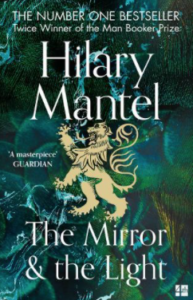 The Mirror and the Light by Hilary Mantel – The concluding chapter of Mantel’s epic trilogy based on the life of Thomas Cromwell (the first two were Wolf Hall and Bring Up the Bodies). That it all ends badly for Cromwell won’t be a spoiler (things usually ended badly for anyone connected with Henry VIII). Cromwell’s reflections as he heads for his inevitable demise are tragic and wonderful. There are those that cannot get on with Mantel’s peculiar style, in which she writes from Cromwell’s point of view but in a curious mix of what seems to be second and third person. But for me, The Mirror and the Light is a capstone to what will prove an enduring literary achievement.
The Mirror and the Light by Hilary Mantel – The concluding chapter of Mantel’s epic trilogy based on the life of Thomas Cromwell (the first two were Wolf Hall and Bring Up the Bodies). That it all ends badly for Cromwell won’t be a spoiler (things usually ended badly for anyone connected with Henry VIII). Cromwell’s reflections as he heads for his inevitable demise are tragic and wonderful. There are those that cannot get on with Mantel’s peculiar style, in which she writes from Cromwell’s point of view but in a curious mix of what seems to be second and third person. But for me, The Mirror and the Light is a capstone to what will prove an enduring literary achievement.
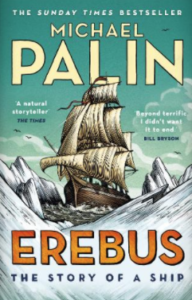 Erebus by Michael Palin – Comedian, explorer and all round Nice Chap Palin tells the history of the Erebus, one of the two ships which (with the Terror) ended its long and storied life wrecked in the remote North American Arctic, as part of Franklin’s failed expedition to find the Northwest Passage. Amazingly, the Erebus represented the peak of technical achievement of the mid-nineteenth century – today’s equivalent would be something like sending an expedition to the Moon. Erebus had sails and a steam engine. Also, tinned food. But the steam engine was underpowered, and the tinned food spoiled, and, having been sealed with lead, poisoned the crew. There’s a lesson here somewhere.
Erebus by Michael Palin – Comedian, explorer and all round Nice Chap Palin tells the history of the Erebus, one of the two ships which (with the Terror) ended its long and storied life wrecked in the remote North American Arctic, as part of Franklin’s failed expedition to find the Northwest Passage. Amazingly, the Erebus represented the peak of technical achievement of the mid-nineteenth century – today’s equivalent would be something like sending an expedition to the Moon. Erebus had sails and a steam engine. Also, tinned food. But the steam engine was underpowered, and the tinned food spoiled, and, having been sealed with lead, poisoned the crew. There’s a lesson here somewhere.
 Jews Don’t Count by David Baddiel – Diversity and Inclusion are everywhere, and quite right too. Or it would be, if it included perhaps the most persecuted minority in history — Jews. This extended pamphlet (it’s only 28,000 words long) conceals an iron fist in a velvet glove. Though deftly written (Baddiel is after all a comedian) it hits hard at the hypocrisy of progressives who espouse diversity and inclusion but ignore Jews, and who even tolerate antisemitism – witness that just over a year ago, Britain could have had a government in which antisemitic attitudes had become mainstream. This should be required reading for self-appointed thought leaders in academia and HR departments everywhere. They won’t read it, of course, because in their own minds they are always right. And even if they did, they wouldn’t get the jokes.
Jews Don’t Count by David Baddiel – Diversity and Inclusion are everywhere, and quite right too. Or it would be, if it included perhaps the most persecuted minority in history — Jews. This extended pamphlet (it’s only 28,000 words long) conceals an iron fist in a velvet glove. Though deftly written (Baddiel is after all a comedian) it hits hard at the hypocrisy of progressives who espouse diversity and inclusion but ignore Jews, and who even tolerate antisemitism – witness that just over a year ago, Britain could have had a government in which antisemitic attitudes had become mainstream. This should be required reading for self-appointed thought leaders in academia and HR departments everywhere. They won’t read it, of course, because in their own minds they are always right. And even if they did, they wouldn’t get the jokes.
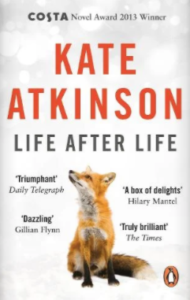 Life after Life by Kate Atkinson – A girl is born on a snowy night in 1910 and immediately dies. A girl is born on a snowy night in 1910, survives for a bit, and then dies. A girl is born on a snowy night in 1910, grows up, and changes history. Possibly. If like me you have wondered what life would have been like had you chosen a road not taken, this is for you. Atmospheric, and, it has to be said, a bit spooky. An honourable mention goes to The Midnight Library by Matt Haig, which explores a very similar theme, and which I also read this year.
Life after Life by Kate Atkinson – A girl is born on a snowy night in 1910 and immediately dies. A girl is born on a snowy night in 1910, survives for a bit, and then dies. A girl is born on a snowy night in 1910, grows up, and changes history. Possibly. If like me you have wondered what life would have been like had you chosen a road not taken, this is for you. Atmospheric, and, it has to be said, a bit spooky. An honourable mention goes to The Midnight Library by Matt Haig, which explores a very similar theme, and which I also read this year.
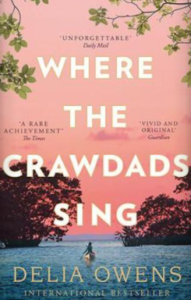 Where the Crawdads Sing by Delia Owens – a tale of a girl who, alone from the age of eight, grows up in a shack in the coastal back-country of the Carolinas and becomes something of an expert of the local wildlife. Not surprisingly so, because she is as much a part of the wildlife as the animals and plants she describes. Explores issues of parenthood, childhood, race, sexual abuse, misogyny and entitlement, but with a refreshingly light touch.
Where the Crawdads Sing by Delia Owens – a tale of a girl who, alone from the age of eight, grows up in a shack in the coastal back-country of the Carolinas and becomes something of an expert of the local wildlife. Not surprisingly so, because she is as much a part of the wildlife as the animals and plants she describes. Explores issues of parenthood, childhood, race, sexual abuse, misogyny and entitlement, but with a refreshingly light touch.
 The Accidental by Ali Smith – a very curious one, this, written in what I’d call an ‘experimental’ style. I am not a great fan of literary fiction, suspecting that a lot of it might well be too far up its own fundament for its own good. This one, however, was worth the effort. It concerns a family that’s relocated to a holiday home in Norfolk and welcomes into its orbit a strange young woman of unknown history – a cuckoo that could have a variety of effects on the family’s equilibrium. Stephen King wrote much the same thing in Needful Things, but at three times the length and with far less elan.
The Accidental by Ali Smith – a very curious one, this, written in what I’d call an ‘experimental’ style. I am not a great fan of literary fiction, suspecting that a lot of it might well be too far up its own fundament for its own good. This one, however, was worth the effort. It concerns a family that’s relocated to a holiday home in Norfolk and welcomes into its orbit a strange young woman of unknown history – a cuckoo that could have a variety of effects on the family’s equilibrium. Stephen King wrote much the same thing in Needful Things, but at three times the length and with far less elan.
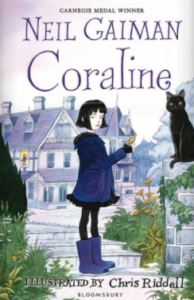 Coraline by Neil Gaiman – rarely a year goes by without the inclusion in my roster of a book by Neil Gaiman, whose books are (in my opinion) consistently first-rate. Coraline, the child heroine, lives with her family in a large crumbling pile long since divided into flats, and so also inhabited by a number of other residents. Well, one day, she opens a door that shouldn’t be opened, and … well, suffice it to say that this is the most frightening book for children (or adults) I have ever read, alongside Struwwelpeter and Peter Rabbit.
Coraline by Neil Gaiman – rarely a year goes by without the inclusion in my roster of a book by Neil Gaiman, whose books are (in my opinion) consistently first-rate. Coraline, the child heroine, lives with her family in a large crumbling pile long since divided into flats, and so also inhabited by a number of other residents. Well, one day, she opens a door that shouldn’t be opened, and … well, suffice it to say that this is the most frightening book for children (or adults) I have ever read, alongside Struwwelpeter and Peter Rabbit.
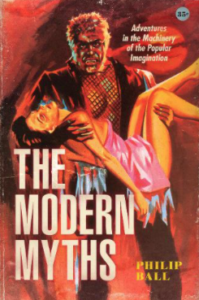 The Modern Myths by Philip Ball – we tend to associate myths with the far past. The doings of Zeus, or Achilles, or Gilgamesh, or Thor. Ball argues that myths are continuously created, and offers some modern examples of tales that started in popular culture but which have transcended their often humble or tawdry beginnings to become mythic tropes. Frankenstein. Dracula. Batman. Jekyll and Hyde. The key to myths is that the originals are often so badly done that they offer scope for others to adopt the tales and run with them. Great literature, it seems, rarely works as myth. I enjoyed this book enormously but found I didn’t agree with all of it. This is the mark of a good book – it leaves plenty of space left for debate and discussion. It made me think.
The Modern Myths by Philip Ball – we tend to associate myths with the far past. The doings of Zeus, or Achilles, or Gilgamesh, or Thor. Ball argues that myths are continuously created, and offers some modern examples of tales that started in popular culture but which have transcended their often humble or tawdry beginnings to become mythic tropes. Frankenstein. Dracula. Batman. Jekyll and Hyde. The key to myths is that the originals are often so badly done that they offer scope for others to adopt the tales and run with them. Great literature, it seems, rarely works as myth. I enjoyed this book enormously but found I didn’t agree with all of it. This is the mark of a good book – it leaves plenty of space left for debate and discussion. It made me think.
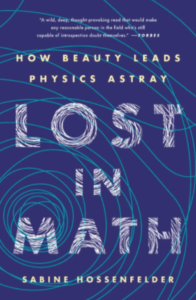 Lost in Math by Sabine Hossenfelder – Theoretical physicists love to sound off grandly about everything, under the impression that such theorising explains just that. Everything, that is. The fact that theoretical physics is broken seems to be a side-issue. Quantum mechanics and gravity can’t be friends. The Standard Model of particle physics, in which everything is made of so many mysterons, schleptons, croutons &c. &c., only works if you pencil in arbitrary values plucked from nowhere that don’t fall out naturally from all the equations. The experiments required to test new hypotheses require equipment far too huge and costly to build. Thus becalmed, physicists have resorted to a kind of scholasticism in which equations have validity as long as they look pretty. It’s not too great a stretch to say it’s become a kind of religion. I’m reminded of the episode of The Big Bang Theory in which theoretical physicist Leonard’s girlfriend, also a theoretical physicist, breaks up with him as they have irreconcilable views. If one believes in loop quantum gravity, and the other in string theory, how would they bring up the children? Sabine Hossenfelder — a theoretical physicist who has seemingly had Doubts — dissects the current crisis in theoretical physics with waspish glee.
Lost in Math by Sabine Hossenfelder – Theoretical physicists love to sound off grandly about everything, under the impression that such theorising explains just that. Everything, that is. The fact that theoretical physics is broken seems to be a side-issue. Quantum mechanics and gravity can’t be friends. The Standard Model of particle physics, in which everything is made of so many mysterons, schleptons, croutons &c. &c., only works if you pencil in arbitrary values plucked from nowhere that don’t fall out naturally from all the equations. The experiments required to test new hypotheses require equipment far too huge and costly to build. Thus becalmed, physicists have resorted to a kind of scholasticism in which equations have validity as long as they look pretty. It’s not too great a stretch to say it’s become a kind of religion. I’m reminded of the episode of The Big Bang Theory in which theoretical physicist Leonard’s girlfriend, also a theoretical physicist, breaks up with him as they have irreconcilable views. If one believes in loop quantum gravity, and the other in string theory, how would they bring up the children? Sabine Hossenfelder — a theoretical physicist who has seemingly had Doubts — dissects the current crisis in theoretical physics with waspish glee.
And the winner is…
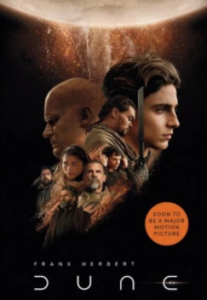 Dune by Frank Herbert, which, with its sequelae Dune Messiah and Children of Dune, constitute just one long novel. I read Dune (but not the sequelae) when I was a teenager and thought it poor. I was subsequently unimpressed by the 1984 Magic Lantern production by David Lynch. I only came back to it following the announcement of the new Magic Lantern Production by Denis Villeneuve (which I have yet to see), and think a great deal better of it. I re-read the first novel and immediately plunged in to Dune Messiah, which I think is better, and then Children Of Dune, which is okay. I haven’t yet read God Emperor of Dune, Antimacassars of Dune, Gloucestershire Grummet-Tinkers’ Scrodes of Dune, Cash-In of Dune, or Jejune Swoon Spitoon of Dune. Just to make that clear.
Dune by Frank Herbert, which, with its sequelae Dune Messiah and Children of Dune, constitute just one long novel. I read Dune (but not the sequelae) when I was a teenager and thought it poor. I was subsequently unimpressed by the 1984 Magic Lantern production by David Lynch. I only came back to it following the announcement of the new Magic Lantern Production by Denis Villeneuve (which I have yet to see), and think a great deal better of it. I re-read the first novel and immediately plunged in to Dune Messiah, which I think is better, and then Children Of Dune, which is okay. I haven’t yet read God Emperor of Dune, Antimacassars of Dune, Gloucestershire Grummet-Tinkers’ Scrodes of Dune, Cash-In of Dune, or Jejune Swoon Spitoon of Dune. Just to make that clear.
So, without wishing to tell you the entire plot, here is the entire plot. Human beings have colonised the Galaxy, but at a cost. Thanks to a kind of luddite revolution some thousands of years before the story opens, all thinking machines are banned, so spaceships are piloted by crew addicted a drug called Spice, or Melange, which is only found on a single planet, Arrakis — or Dune, on account of the fact that the entire planet is a desert. Spice has mind-expanding properties that allow the pilots to access hyperspace and thus direct their spacecraft. Spice is a natural product, the effluvia of sandworms, burrowing creatures so gigantic that they make tube trains look like small pieces of wet string loosely tied together.
Dune is governed as a fiefdom awarded by the Galactic Emperor to one or other of the several Noble Families. As the novel opens, the horrible Harkonnen family is to step down to make way for the heroic Atreides family, formerly of the pleasant planet Caladan. But it’s all a wicked plot by the Emperor and the Harkonnens to dispose of the Atreides as the result of a decades-long ritual feud. But the wicked plot of those naughty Harkonnens is foiled by Paul, the Atreides heir, who turns out to have Special Powers, being as he is the culmination of a generations-long breeding program set up by the Bene Gesserit Sisterhood (imagine the Shaolin Monks, but as nuns). Notwithstanding inasmuch as which Paul falls in with the Fremen, the spice-addicted Bedouin-like human inhabitants of Dune; gets himself addicted to Spice, which supercharges his Special Powers (did I mention his Special Powers?); foils the Horrendous Harkonnens; and, well, you can take it from there.
An over-wrought combination of Space Opera and Sword-and-Sorcery Epic, this could so easily have fallen flat on its face. But the density of plotting, the high adventure, the exploration of exotic philosophies, and the sheer sensawunda keeps it in a state of never quite collapsing. Dune was published around sixty years ago, in the Golden Age of pulp SF that gave us Asimov, Heinlein, Clarke and so on, and has that same vitality, for all that some of it seems dated. In hindsight you can see how much Star Wars owes Dune. The Jedi owe a great deal to the Bene Gesserit — especially the use of tones of voice to influence others. That, and the connection between bloodlines and the Force. Sandworms are the Sarlacc; Dune is Tatooine; Paul is Luke; Duncan Idaho is Han Solo; the Harkonnens are … well, you can work that one out for yourself.

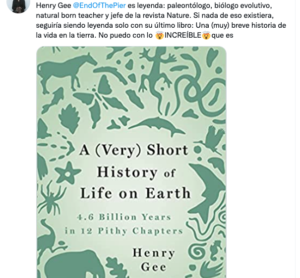











 The Times review gave sales a huge boost. Amazon rankings shot up well into the top 200 of all books – up with colouring books, celebrity autobiographies, books for children, and editions of novels by
The Times review gave sales a huge boost. Amazon rankings shot up well into the top 200 of all books – up with colouring books, celebrity autobiographies, books for children, and editions of novels by 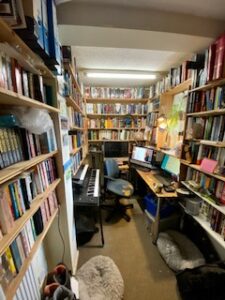

 And here it is after the first coat of Homebase Pure Brilliant White. One thing I discovered while doing this job is that, like Michelangelo, I don’t like painting ceilings very much. A friend suggested I send the bill to the Pope. So His Holiness might soon be getting a receipt for a large tub of the aforementioned Homebase Pure Brilliant White. and a paint roller.
And here it is after the first coat of Homebase Pure Brilliant White. One thing I discovered while doing this job is that, like Michelangelo, I don’t like painting ceilings very much. A friend suggested I send the bill to the Pope. So His Holiness might soon be getting a receipt for a large tub of the aforementioned Homebase Pure Brilliant White. and a paint roller. Then the time came to install a large shelf with legs, which has pretensions to being a desk.
Then the time came to install a large shelf with legs, which has pretensions to being a desk. After a lot more vacuuming it was time to install new carpet tiles. Last time I did this I glued them down with special tile adhesive, and after some time in this confined space I felt that I was being cheered enthusiastically on by Harvey the Giant Pink Octopus and his All-Star Orchestra featuring the Crustacean Choristers, with, towards the end, Agama Gekko and the Iguana Brass. This time the tiles were thicker and backed with bitumen, so could simply be laid flat on the ex-council lino, without adhesive of any kind, not even hallucinogenic, although I still had to cut a few to fit. This only took an evening, but took longer than it might have done because the dog felt she had to come and ‘help’. This meant that short bursts with a sharp knife and straight-edge were interspersed with longer intervals of rolling around on the floor admiring whichever soft toy was the dog’s favorite that day.
After a lot more vacuuming it was time to install new carpet tiles. Last time I did this I glued them down with special tile adhesive, and after some time in this confined space I felt that I was being cheered enthusiastically on by Harvey the Giant Pink Octopus and his All-Star Orchestra featuring the Crustacean Choristers, with, towards the end, Agama Gekko and the Iguana Brass. This time the tiles were thicker and backed with bitumen, so could simply be laid flat on the ex-council lino, without adhesive of any kind, not even hallucinogenic, although I still had to cut a few to fit. This only took an evening, but took longer than it might have done because the dog felt she had to come and ‘help’. This meant that short bursts with a sharp knife and straight-edge were interspersed with longer intervals of rolling around on the floor admiring whichever soft toy was the dog’s favorite that day. Only then could I install the computers and associated electrical equipment – much easier to do before the books come back.
Only then could I install the computers and associated electrical equipment – much easier to do before the books come back.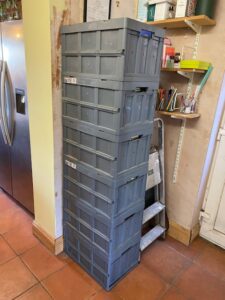 And now, the books. The refurbishment was an excellent opportunity to have a cull. I really don’t like getting rid of books, but as I am fast coming up to rapidly approaching my seventh decade, I made one of two executive decisions – that if I have read a book and am unlikely to read it again, then I should donate it to a charity shop so someone else can have a go. This picture shows a huge pile of crates filled with books destined for our favourite secondhand bookstore, which is at
And now, the books. The refurbishment was an excellent opportunity to have a cull. I really don’t like getting rid of books, but as I am fast coming up to rapidly approaching my seventh decade, I made one of two executive decisions – that if I have read a book and am unlikely to read it again, then I should donate it to a charity shop so someone else can have a go. This picture shows a huge pile of crates filled with books destined for our favourite secondhand bookstore, which is at  The remaining books re-shelved, the last task was to reinstall Flabbey Road, my home studio. Which I did. The second executive decision I made was that my days of live playing are over. I really don’t much like wiring things up, taking all the wires out again, schlepping huge boxes around in the middle of the night, wiring them up again, playing for
The remaining books re-shelved, the last task was to reinstall Flabbey Road, my home studio. Which I did. The second executive decision I made was that my days of live playing are over. I really don’t much like wiring things up, taking all the wires out again, schlepping huge boxes around in the middle of the night, wiring them up again, playing for 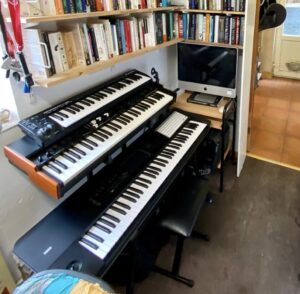 Here is what it looks like from the other end.
Here is what it looks like from the other end.